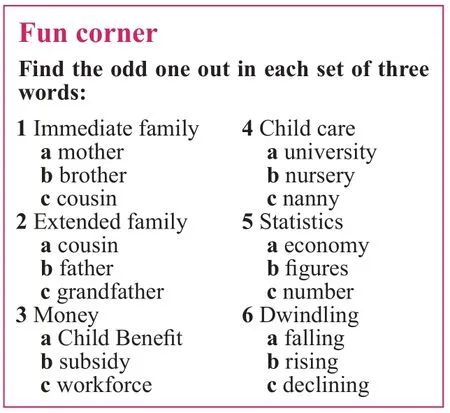Fading Families
2018-07-27ByDaltonamendedbyJonPorter
By A. J. Dalton (amended by Jon Porter)

The traditional description of the British family is a father, a mother and 2.4 children (on average). However, figures published by the UK government in 2006 revealed that:
■ 42 per cent of marriages in the UK end in divorce, which is the highest rate in Europe (but actually the lowest in the UK for 40 years)
■ 24 per cent of children grow up in single-parent families
■ the average number of children in a British family is 1.9.
So what is happening to the British family? Is it an endangered species?
1 With the average number of children in a British family falling beneath an average of 2.0, the population of the UK has been falling for quite a few years. The size of the British workforce is declining and the average age of the workforce is rising. This trend is quite worrying for the British economy.
2 Why aren’t the British having as many children as they used to? Well, there is a whole range of reasons. One of them is that British people are now having their children at a much older age than previously, meaning they have fewer years in which they can have children. Most young people today want a well-paid job, so they often go to university after school. After years of study at university, they then need a few years of work experience before they can get the job they want.
3 What about marriage and buying a home? Well, houses are incredibly expensive in the UK,so many people are forced to stay with their parents early in their careers. And no-one wants to start a new family when they are still living with their parents! So it’s not until people are about 30 years old that they can afford to move out, buy their own home, and then they can start to think about settling down and having children.
4 So a British person manages to get a job, get a home and get married. Why isn’t he or she then having at least two children on average? The main reason is that it is relatively expensive to bring up a child in the UK. Usually both parents need to work just to pay for their home and living expenses. Because both parents are at work, that means they then need to pay someone to look after their child during the day, such as a nanny or nursery school, both of which are expensive.
5 In addition, problems in the global economy often affect British families. For example, when times are tough and there is an economic downturn, prices rise or it becomes more difficult to find a job or keep your existing one. This kind of uncertainty discourages people from having larger families. And with this much pressure on families, is it any surprise that the divorce rate is so high?
6 So what is Britain doing to try and save the British family? First of all, the government is trying to make it cheaper to have children. For example, there have been increases in Child Benefit money families can claim from the state each month. Also, there is an increasing amount of government subsidy for nursery schools, so that parents do not need to pay so much for childcare. In addition, there are now laws allowing parents to take more time off work so that they can look after their children themselves rather than having to pay others to do it.
7 The UK government has also tried to reduce the number of hours British parents have to work to earn enough money to pay their bills. By law, you cannot work for more than 48 hours per week, averaged over 17 weeks. If parents didn’t have to work so many hours, they’d have more time to spend with their children and wouldn’t need to spend so much on childcare. On average, a Briton works 43.6 hours a week, which is actually a 6 per cent decrease over the last decade, but still the highest in Europe. It’s a bad ‘work-life balance’ and is damaging British society.
Let’s hope it’s not too late to save the British family. Otherwise, the British won’t have enough time, energy or money to have children. And where’s the fun in that?

Word(s) of the day
The phrase ‘work-life balance’ refers to the number of hours you work compared with the number of hours you don’t. People say either ‘I have a good work-life balance’ or ‘I have a bad work-life balance’.
Activity 1: Headings
Match the following headings to the paragraphs numbered 1–7.
a Home birds
b Dwindling population
c Convincing employers
d Costly kids
e Too old too young
f Easing the burden
g Stress and strain
Activity 2: Collocations
Match the terms to form phrases from the article.
One answer is given.
1 economic (c)2 work-life
3 nursery
4 living
5 single-parent
6 time
7 Child
a balance
b expenses
c downturn (1)
d Benefit
e school
f family
g off work
Activity 3: True or false
According to the article, are these statements true (T) or false (F)?
1 The UK government wants employees to work more than 49 hours a week.
2 The UK government is increasing the price of nursery schools.
3 Most young people in Britain cannot afford to move out of their parents’ house when they have finished their university study.
4 A majority of British children grow up in single-parent families.
5 More marriages fail than succeed in the UK.
6 One of the biggest problems for families in the UK is that both parents usually have to work to pay all the bills.
